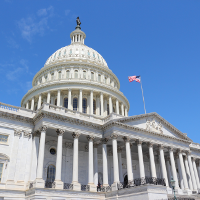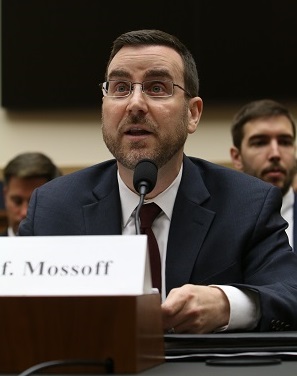 CPIP co-founder Adam Mossoff testified on June 13 before the House Judiciary Committee’s subcommittee on the Courts, Intellectual Property and the Internet. He and other witnesses testified about the impact of the Supreme Courts recent decision in TC Heartland LLC v. Kraft Foods Group Brands LLC on innovators and the possibility of future changes to patent law.
CPIP co-founder Adam Mossoff testified on June 13 before the House Judiciary Committee’s subcommittee on the Courts, Intellectual Property and the Internet. He and other witnesses testified about the impact of the Supreme Courts recent decision in TC Heartland LLC v. Kraft Foods Group Brands LLC on innovators and the possibility of future changes to patent law.
For those not familiar with the decision, it held that patent lawsuits against corporations must be filed either where the corporation is incorporated or where it has infringed the patent and has a “regular and established placed of business.” This is different than the rule for most litigation which generally allows a lawsuit to be filed wherever a court may exercise jurisdiction over the corporation. Thus, TC Heartland placed constraints on patent owners enforcing their rights that don’t exist for other litigants.
Although the hearing was nominally about TC Heartland and venue for patent suits, Members of Congress and witnesses took the opportunity to address broader issues of innovation policy. In his opening statement, Professor Mossoff primarily described how patent owners—particularly individual inventors and small businesses—will now be required to file multiple lawsuits all across the country to enforce their rights. This will drastically increase the costs of protecting their property from infringers, which for many innovators will be cost prohibitive. Professor Mossoff mentioned one such inventor, Bunch-o-Balloons inventor Josh Malone, who is being seriously harmed by the inability to protect his invention from rampant infringement. Together with the litany of other recent disastrous changes to our patent system, innovators are now in a precarious position when deciding to rely on patents to protect their inventions.
Much of the hearing was taken up by questions of what the impact of the TC Heartland decision will be. There was general agreement that the concentration of patent cases in only a few districts will continue. Under the old regime, many cases were filed in the Eastern District of Texas. Under the new regime, these cases will now be filed in the Northern District of California or the District of Delaware. There was also general agreement that this would benefit accused infringers, who will now be litigating in their preferred fora.
 Unfortunately, much of the discussion centered around a perceived problem with patent “trolls.” This epithet based on myths is often used in the place of reasoned debate for patent policy. As Professor Mossoff explained, as deployed in research and policy debates, this term would make even famous inventors like Thomas Edison a troll. Furthermore, it is both wrong and irresponsible to assume that patent owners who license their inventions are practicing an illegitimate business model. Just as it is perfectly legitimate for a landlord to rent her property instead of selling it, it is likewise perfectly legitimate for a patent owner to license her patent rights instead of manufacturing and selling products to customers. And just as it is legitimate for a landlord to sue a squatter for trespass, it is equally legitimate for a patent owner who licenses her property rights to sue for infringement.
Unfortunately, much of the discussion centered around a perceived problem with patent “trolls.” This epithet based on myths is often used in the place of reasoned debate for patent policy. As Professor Mossoff explained, as deployed in research and policy debates, this term would make even famous inventors like Thomas Edison a troll. Furthermore, it is both wrong and irresponsible to assume that patent owners who license their inventions are practicing an illegitimate business model. Just as it is perfectly legitimate for a landlord to rent her property instead of selling it, it is likewise perfectly legitimate for a patent owner to license her patent rights instead of manufacturing and selling products to customers. And just as it is legitimate for a landlord to sue a squatter for trespass, it is equally legitimate for a patent owner who licenses her property rights to sue for infringement.
Several questions focused on broader patent issues in the context of whether or what Congress should do next for patent law. The Global Intellectual Property Center of the Chamber of Commerce recently reported that the United States had slipped from 1st to 10th in their annual ranking of patent systems. Reasons for the degradation of our patent system are obvious: death squads killing patents at the PTAB, subject matter eligibility standards that make oil rigs outside the scope of patent laws, and the inability of patent owners to prevent others from infringing their rights through injunctions.
As Professor Mossoff emphasized, Congress’ first priority should be “do no harm.” Rather than make another attempt to pass legislation further restricting patent owners’ rights, it would be better for Congress to simply do nothing. However, Congress could make the patent system better for innovators. One step already being discussed that would be a positive improvement is the suggestion to amend section 101 to limit the scope of the judicial exceptions to subject matter eligibility. At the hearing, Professor Mossoff astutely noted that the first patent ever issued in the United States—being held up at that moment by Chairman Darrell Issa—would likely be invalidated under current patent eligibility standards.
Many questions directed at the witnesses asked for them to propose specific solutions to either perceived venue abuses or broader patent law issues. Professor Mossoff stressed that systemic changes to the patent system will not just affect a few bad actors, but all of the individual inventors, small businesses, universities, licensing companies, and R&D-intensive high-tech and bio-pharma companies who rely on the patent system to protect their innovations. These types of companies have been the fountainhead of the U.S. innovation economy for more than 200 years. “Reform” that only addresses the concerns of accused infringers, but not the costs to patent owners, is doomed to do more harm than good.
Professor Mossoff’s written testimony can be found here. Video of the hearing can be found here.